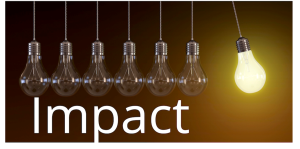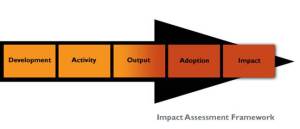 A couple of weeks ago I was asked to talk to an audience of health service researchers at the Health Services Research UK meeting on ‘Impact’. It’s a word that conjures up all kinds of metaphors and images and at times it’s not entirely clear what we mean by it. I explored that a little during my presentation (find a copy here) but wanted to do some more musing on the ‘Impact agenda’ and what it means for health service researchers and knowledge mobilisers.
A couple of weeks ago I was asked to talk to an audience of health service researchers at the Health Services Research UK meeting on ‘Impact’. It’s a word that conjures up all kinds of metaphors and images and at times it’s not entirely clear what we mean by it. I explored that a little during my presentation (find a copy here) but wanted to do some more musing on the ‘Impact agenda’ and what it means for health service researchers and knowledge mobilisers.
So when we think of the word ‘impact’, what sort of images do we come up with? A car crash, perhaps, or maybe a punch to the face? This would tie in petty well with the Oxford English Dictionary’s definition which is “the action of one object coming forcibly into contact with another”. For HSRUK, it conjured up the image at the top of the page, which is what they used for their advertising. My reflection on all this? It doesn’t seem too friendly, does it, and if that lightbulb hit the others, we can guess what would happen…!
 But it’s not all bad news. In the worlds of business and commercial writing, ‘impact’ has become a popular buzzword and is used to mean ‘have a marked effect or influence’ (although a punch to the face is likely to have a fairly marked effect too!) In this world, it’s seen as something to be prized and sought after. But for me it still seems reminiscent of the jargon used by some of the more go-getting, aggressive and individualistic contestants on TV shows like The Apprentice. So it’s a bit of a turn-off, if I’m honest.
But it’s not all bad news. In the worlds of business and commercial writing, ‘impact’ has become a popular buzzword and is used to mean ‘have a marked effect or influence’ (although a punch to the face is likely to have a fairly marked effect too!) In this world, it’s seen as something to be prized and sought after. But for me it still seems reminiscent of the jargon used by some of the more go-getting, aggressive and individualistic contestants on TV shows like The Apprentice. So it’s a bit of a turn-off, if I’m honest.
In academia, we’ve adopted the word to refer to the idea of making a difference with our research. For those of us in the UK it’s also now synonymous with the Research Excellence Framework (REF), the system used to measure the quality of university research and award government funding accordingly. Universities who can demonstrate the impact of their research now have the potential to be rewarded for that, as well as for its academic rigour and quality. What this means is that the pressure is now on to find ways of measuring and demonstrating how we have made a difference with our research.
 But the idea of measuring and demonstrating impact frustrates many of us who are actively trying to make a difference with our research and help others do the same. Myself and one or two colleagues will readily admit that the whole thing makes us rather grumpy! But why is that? Surely if we are passionate about making a difference, then we should be equally passionate about measuring or demonstrating that? The problem comes when we think about how university senior managers and many academics think about ‘impact’. Sometimes it seems as if they presume that the process looks a bit like the diagram on the left. Neat, isn’t it?
But the idea of measuring and demonstrating impact frustrates many of us who are actively trying to make a difference with our research and help others do the same. Myself and one or two colleagues will readily admit that the whole thing makes us rather grumpy! But why is that? Surely if we are passionate about making a difference, then we should be equally passionate about measuring or demonstrating that? The problem comes when we think about how university senior managers and many academics think about ‘impact’. Sometimes it seems as if they presume that the process looks a bit like the diagram on the left. Neat, isn’t it?
But those of us working in knowledge mobilisation know that the worlds in which we are trying to make difference look a bit more like Grayson Perry’s amazing ‘Map of Days‘. They are full of people’s firm opinions, intuition, assumptions, subjectivity and tired habits. In other words – all sorts of other knowledge and experiences. And we know that if we want to make a difference with our research, collaboration and relationships need to be our buzzwords. We need to be able to create research knowledge with people, rather than for people. And that will require a fundamental shift in how we think about documenting and demonstrating the differences that we have made together and the types of differences that we value and measure.

Thank you Vicky for the stimulating post — one of many which I have enjoyed reading. I can’t agree with you more that collaboration and relationships should be our buzzwords, but also the essence of what we are doing, i.e. knowledge co-production. Our “impact” thus can be easily demonstrated by co-authored research outputs with colleagues from other professions and institutions.
LikeLike
I agree, Pavel, that’s one way of doing it. But I assume you are talking about more than co-authored papers in academic journals? It would be great if you have an example of a co-authored research output. Thanks for joining the conversation.
LikeLike
I also agree that collaborations and relationships are critical. I point out to my researchers that they don’t make products, their industry partners do. And they don’t make public policy, their government partners do. And they generally don’t deliver social services, their community partners do. Therefore, if they want their research to have an impact on the lives of real people they only do so by working partners from the private, public and non profit sectors.
LikeLiked by 1 person